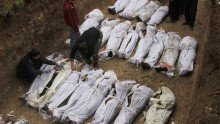The current situation in Syria is blood curdling. Daily we’re bombarded with barbaric images of men,women and children gasping for breath. Innocent families are forced to abandon their livelihoods and homes. Entire towns are being destroyed; quite literally in the blink of an eye.
We know the West widely condemn the savage acts Bashar al-Assad and those closest to him are alleged to have carried out. We know that the call for regime change is wide spread. The Arab League want to see the back of Assad as their ministers held little hesitance blaming the regime for the recent chemical attacks.
But where did it all go so wrong so fast? What’s the current situation? And is Bashar al-Assad really the ring master in this torrid affair, or does his younger brother Maher al-Assad actually have the firmest grasp on the reigns of power?
The rise of the Assad family is inextricably associated with Syria’s contemporary history. It was Hafez al-Assad, Bashar’s Father, in 1970 who began what has turned out to be a fourty three year and counting dictatorship.
When Bashar al-Assad entered the realms of power after his fathers death in 2000, all looked promising; at least on the surface it did. He explored different tactics and looked to be a more moderate leader. Assad began to release prisoners, encouraged intellectual debate and shut down the infamous Mezze prison.
Yet Syria is now renowned as a country with one of the worst human rights records in the world. Competitive media is unheard of. State run news channels act as a propaganda source to draw in the masses. Free speech simply doesn’t exist. If you don’t like the decisions made by the Syrian dictatorship you will be suppressed, imprisoned or worse.
The future for Syria, therefore, looks incredibly bleak. Not just in terms of sectarian violence but socially and economically too. Even those who are fortunate enough to live in areas unaffected by the bloodshed are suffering.
Inevitable sanctions imposed by the EU, US and Arab League have resulted in tourism and oil; the two financial sectors on which Syria is so dependent, suffering beyond immediate repair. This has had a devastating impact on the Syrian economy, with the IMF declaring the economy shrank by 2% in the first year of the conflict alone.
In conflict hit areas unemployment has rocketed and access to basic amenities such as food, water and electricity are becoming increasingly sparse. The decisions innocent families are being forced to make on a daily basis are truly incomprehensible. Do you risk everything; your family, house, job and stay in the village you’ve lived in all your life? Do you leave everything you’ve ever worked for and flea, becoming a refugee and a shell of what you know?
It’s an impossible decision for many to make. It’s also very easy to immediately point the finger of blame at Bashar al- Assad, and rightly so. But how bigger part does his brother Maher al-Assad play in the dictatorship? And while he is such a dominant figure in the echelons of government is a peaceful transfer of power even possible?
Many see Bashar as the spokesman President. Not a powerful, independent, strong minded leader. Instead, it’s his hot headed younger brother Maher who is seen as the enforcer of the savage dictatorship’s rhetoric.
It’s Maher al-Assad who is the commander of Syria’s special forces. Partner this with the totalitarian power of Bashar and together the brothers pose a quite terrifying dilemma. It’s incredibly difficult to determine exactly who gives the orders. It’s Bashar who is commander in chief, it’s he who has the final say. But is that really the case? After all, Maher’s main role is head of the Republican Guard. He is discussed behind the shadow of whispers. He’s known for his unrelenting brutality and holds the stature of a military heavyweight.
Maher displays an unrelenting, indiscriminatory streak of evil. Just look at his late brother-in-law, Assef Shawkat, who he once shot after a heated dispute leading to the need for life saving surgery in France.
Although Maher al-Assad hasn’t been seen in public since he was believed to have been injured in a car bombing last year, he is still the key figure of blame for August’s chemical attacks. And this claim isn’t unfounded. The chemical attacks happened with an unexpected haste and even seemed to catch the Presidential Palace off guard.
In truth it’s impossible to predict what the coming weeks, months and years hold for Syria. Turmoil would seem unavoidable, more innocent blood shed would seem even more unavoidable and a peaceful political solution would seem unlikely. But hope is the only feeling many Syrians can endure. Hope for a brighter tomorrow, where freedom to walk down the street without fear is a reality. Hope that parents can feed their children and live a ‘normal’ life. Yet perhaps ‘normality’ is no longer possible in Syria. It will take decades to rebuild what was and still is an incredibly beautiful country both aesthetically and socially. All we can do as mere onlookers is share that feeling of hope and seek to help achieve a peaceful solution in any way we can.
Jack Aspinall







